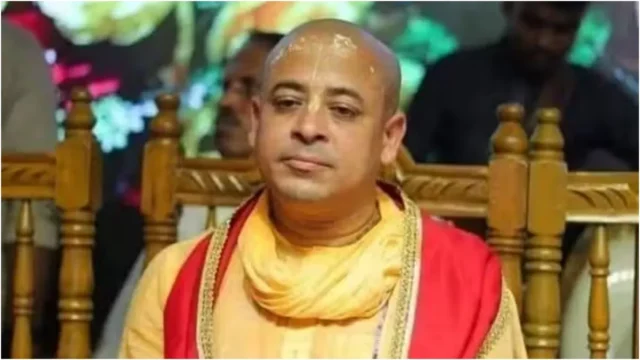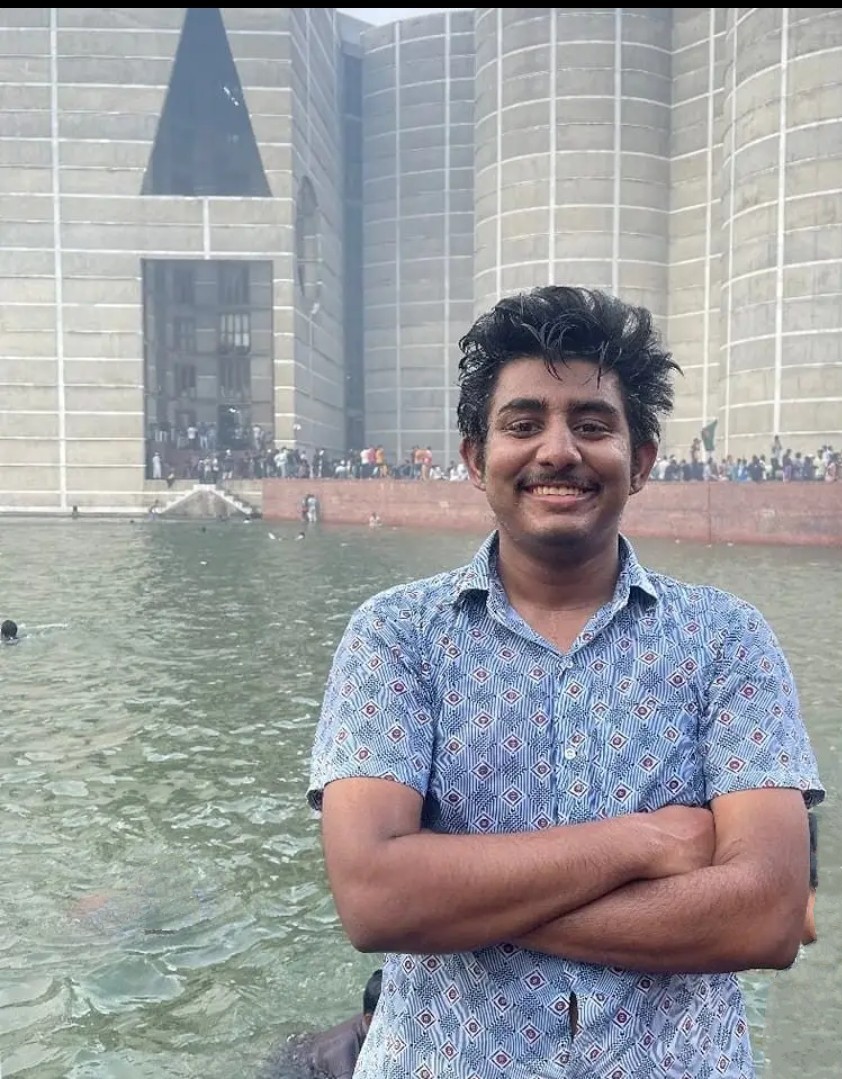By Kamal Sikder
Since the ousting of Sheikh Hasina, India has exhibited aggressive behaviour, seemingly intent on destabilizing Bangladesh through a series of orchestrated incidents. One such attempt involved leveraging ISKCON to stir unrest within the country. However, the Bangladeshi government swiftly countered this effort by arresting ISKCON spokesperson Chinmoy Krishna Das. Interestingly, ISKCON itself has distanced itself from Das, claiming he was expelled from the organization due to allegations of child abuse.
What is the issue under debate?
ISKCON, often considered aligned with India’s Hindutva-driven political circles, has faced allegations of spreading propaganda and disrupting social harmony in Bangladesh. The arrest of Chinmoy Krishna Das, a former ISKCON leader, sparked widespread unrest. Das was reportedly involved in delivering inflammatory speeches across the country, particularly following the regime change in Bangladesh, as Sheikh Hasina’s government exited, making way for new leadership. Some ISKCON supporters have gone as far as directly calling for the Indian military to invade Bangladesh.
Chinmoy’s activities allegedly intensified amidst India’s Modi administration’s rising anti-minority rhetoric. This culminated in a backlash when Bangladesh authorities detained him to restore law and order, further exacerbating tensions between the two nations.
In the wake of Chinmoy’s arrest, pressure from Indian political leaders, particularly those linked to Hindutva ideologies, has grown significantly. High-profile figures, including Andhra Pradesh Chief Minister Pawan Kalyan, have publicly condemned the arrest, urging collective Indian efforts to influence Bangladesh’s internal policies. Kalyan’s statements emphasized India’s historical sacrifices during Bangladesh’s independence war, implying an obligation for Bangladesh to heed Indian concerns.
ISKCON’s Indian chapter has also called for international intervention, urging Prime Minister Narendra Modi to bring the issue to the United Nations. Major Indian media outlets have amplified these narratives, portraying the incident as a violation of human rights and freedom of religion.
Following Das’s detention, violent protests erupted in court areas where his bail plea was denied. Reports indicate clashes instigated by ISKCON supporters, leading to the tragic death of a Muslim lawyer, Saiful Islam. While Indian media attributed the violence to Islamist groups, Bangladeshi sources clarified that the chaos stemmed from ISKCON supporters’ aggressive actions. These incidents have fuelled misinformation campaigns, with Indian outlets framing the event as religious persecution.
The developments reflect a broader strategy to exert pressure on Bangladesh’s new government, undermining its credibility and creating divisions. By portraying itself as a protector of Hindu minorities in Bangladesh, the Modi government seemingly aims to project an image of regional dominance. However, this approach risks reigniting historical divisions, such as the two-nation theory championed by Muhammad Ali Jinnah.
India is the haven for minority persecution
The situation also reveals India’s selective focus. While Indian minorities face systemic challenges domestically, its leadership appears more invested in Bangladesh’s internal affairs, raising questions about the priorities and motivations driving these actions.
Recent developments in Bangladesh have raised alarm in South Block, as tensions escalate surrounding ISKCON’s (International Society for Krishna Consciousness) alleged activities. Speculations about the organization’s role as an Indian proxy and its involvement in stirring communal unrest have garnered significant attention. This article explores the situation, analyzing the implications for India-Bangladesh relations.
Following the weakening of Sheikh Hasina’s government, concerns have surfaced regarding India’s perceived influence through proxy organizations. Among these, ISKCON has been highlighted for its reported connections to Hindutva agendas. The organization is accused of fomenting discord by inciting violence and delivering provocative speeches under the guise of peaceful protests. Reports suggest a deliberate effort to exploit minority issues in Bangladesh, allegedly aligning with Indian interests to destabilize the nation’s political scenario.
A high-profile case involving the murder of a Muslim lawyer and Assistant Public Prosecutor Saiful Islam, attributed to ISKCON extremists, has further inflamed public sentiment. Massive protests by People and students in Dhaka have called for strict action against ISKCON.
Intellectuals like Ashok Swain have highlighted growing anti-India sentiments in Bangladesh, pointing to ISKCON’s perceived role as an agent of Hindutva policies. This has prompted fears of a potential ban on the organization in Bangladesh.
The Bangladeshi government is reportedly scrutinizing ISKCON’s activities, funding sources, and affiliations. Officials have hinted at declaring the organization a fundamentalist group. The Attorney General’s office has expressed concerns over ISKCON’s operations, suggesting they may contravene Bangladesh’s laws and jeopardize national harmony.
India’s Ministry of External Affairs has issued statements defending ISKCON, emphasizing its cultural and religious role. This rare intervention in Bangladesh’s internal matters highlights ISKCON’s significance to India’s regional strategy, particularly concerning Hindu-Muslim relations in the neighbouring country. However, a statement from Bangladesh’s Ministry of External Affairs dismissed India’s claims and cautioned that such actions could strain the friendly relations between the two nations.
The BJP-led Hindu nationalist government has openly incited violence against minorities, specifically targeting Muslim places of worship by baselessly claiming they were once temples, often relying on falsified evidence or no proof at all. Hindu nationalism poses a global threat, as recently highlighted by incidents in Canada and the USA. According to the Canadian government, India’s Home Minister Amit Shah was directly implicated in the assassination of a Sikh independence leader. Additionally, an assassination attempt on another Sikh leader in the USA was thwarted. These events demonstrate the audacity of Hindu nationalists to conduct operations even within Western countries.
ISKCON has faced bans in other nations, such as Singapore, due to past controversies. If Bangladesh proceeds with restrictions, it could deliver a significant blow to Hindutva-aligned groups leveraging ISKCON for political mobilization.
The escalating scrutiny of ISKCON in Bangladesh underscores a complex interplay of religion, politics, and regional diplomacy. While the Bangladeshi government evaluates the organization’s activities, its decision could have profound implications for Indo-Bangladeshi relations and the broader geopolitical landscape. The coming weeks will reveal whether ISKCON can weather the storm or faces a ban that reshapes its role in the region.










